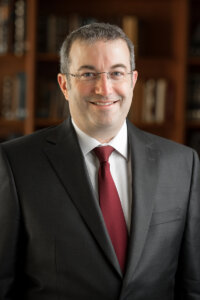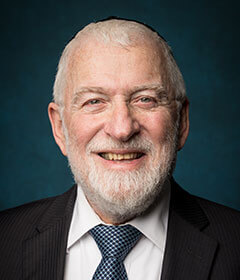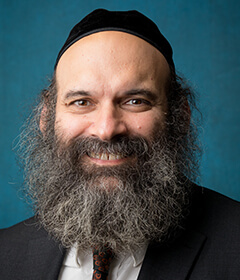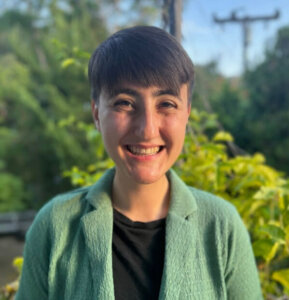On May 9, Yeshiva University’s head rabbis dissolved a student LGBTQ club the school had approved only 50 days earlier. Photo by Spencer Platt/Getty Images
Yeshiva University’s head rabbis were drawing a line in the sand. With questions flying about a settlement establishing an LGBTQ club at the school, they issued a new edict for the group: no rainbow emojis.
“Pride flags, symbols, and emojis as well as the term ‘Pride Club’ are not sanctioned in any context,” the rabbis, known as roshei yeshiva, wrote April 10 in a message to students. They also ordered the club, known as Hareni, to note on all its flyers that it upheld “traditional halachic standards of sexual morality” — for gay students, that meant celibacy — and said any social event proposals would be rejected.
There was just one problem. It was not clear that the settlement, signed three weeks earlier by the YU administration, allowed the rabbis to impose new rules on Hareni. In fact, the terms of the deal had largely excluded the rabbis, granting broad independence to the club provided that its activities existed “within the framework of halacha,” or Jewish law. The vast majority of the rabbis had never been consulted on the deal before it was signed.

YU’s administration had tried to strike an impossibly delicate balance in the settlement, hoping to bring peace with students, end expensive litigation, and preserve the school’s religious integrity. But any settlement would be virtually meaningless without the approval of the head rabbis, who give the institution its standing in the greater Orthodox world. It quickly became clear that the school didn’t have it. When student leaders went March 20 to The New York Times to declare victory — a surprise move that put the school and the rabbis on the defensive — a clock started ticking on the club’s demise.
On May 9, after those same students ignored the flyer rule and held their first event off-campus, the roshei yeshiva unilaterally dissolved the club. “Hareni is operating as a pride club,” they wrote in an unsigned memo, “and as such is antithetical to the Torah values of the yeshiva.” The first LGBTQ club to be recognized by Yeshiva University had lasted all of 50 days.
The settlement’s failure raises a slew of questions: Why did YU President Rabbi Ari Berman agree to terms the roshei yeshiva would almost certainly reject? Why did the roshei yeshiva find the agreement so dangerous? For both queer YU students and more broadly for queer Orthodox Jews, what did the lawsuit ultimately accomplish? And what happens now?
The following summary of what is currently known about the settlement — and what remains unknown — is based on dozens of public statements related to the case, as well as interviews with 11 individuals with knowledge of it, including four of the plaintiffs and one rosh yeshiva. It paints a picture of a school that seemed to badly misread where its rabbis drew the line on LGBTQ inclusion, of rabbis who felt forced to intervene to save the institution, and of students who thought they won a war that had only just begun.
For now, the question of where LGBTQ Jews fit into Orthodoxy — perhaps the defining religious issue of the movement today — is out of the American court system, where it once seemed destined for the Supreme Court, and back at an impasse between Jewish values and Jewish law, where it has stubbornly stood since long before any YU students started a Pride club.
Rabbinic participation — and withdrawal
The lawsuit against Yeshiva University, which has around 2,700 undergraduates spread across two Manhattan campuses separated by gender, began in April 2021, when a group of four students and alumni claimed the school had discriminated against them by refusing to approve their LGBTQ club, then called the YU Pride Alliance.
The school said that recognizing the club would be a violation of its religious freedom because LGBTQ relationships are forbidden by halacha. But a New York judge sided with the students, ruling that the school was subject to discrimination law because it was legally an educational institution, not a religious one. The school appealed, and over the next few years, the case moved slowly through state courts.
The school tried to negotiate with the students. Rabbi Mayer Twersky, one of five senior members of the roshei yeshiva, said he was invited in June 2021 to participate in negotiations.
Twersky, a hardliner on LGBTQ issues, refused, telling Berman that even negotiating with the club amounted to a desecration of God’s name. But negotiations between the club and the school continued over Twersky’s objections.

In October 2022, after the U.S. Supreme Court denied the university’s emergency petition to hear the case, the school announced it was launching a student LGBTQ club that, unlike the Pride Alliance in its view, would be in accordance with Jewish law.
The new club, Kol Yisrael Arevim, had the blessing of Rabbi Hershel Schachter, a senior rosh yeshiva and the school’s foremost religious authority, who said the club’s intent was to provide chizuk, or encouragement, to LGBTQ students struggling with their identity but committed to a life of celibacy. At the time, there was spirited debate among the roshei yeshiva about whether this unilateral offer from the school went too far. (Twersky told Berman it was “pandering.”) But in any case, Kol Yisrael Arevim failed to resolve the litigation: the Pride Alliance never saw it as more than a stunt.
Schachter, the most respected authority on Jewish law at the school — and arguably in Modern Orthodoxy today — would later say that the 2022 discussions around Kol Yisrael Arevim were the last time he was consulted on the lawsuit.
No one involved in the litigation would say whether the three other senior roshei yeshiva — Yaakov Neuburger, Mordechai Willig and Michael Rosensweig — were involved in the lead-up to the settlement. Under the deal’s terms, Rabbi Neuburger, the roshei yeshiva’s liaison to the Office of Student Life, would be responsible for approving or rejecting any Hareni events, as he was for all other student groups. But it was unclear whether Neuburger, who has not spoken publicly about the deal and did not respond to an inquiry, had any say in the agreement itself.
What became clear during the backlash was that the 20 or so non-senior roshei yeshiva had not been consulted on the terms before the school agreed to them. It remains unclear why they were not.
Finding alignment
The alumni who initiated the lawsuit were always joined in settlement discussions by the current Pride Alliance presidents, who changed from year to year. One of this year’s co-presidents, Schneur Friedman, said in an interview that he was probably more open to compromise than his predecessors.
So when Friedman and his co-president, Hayley Goldberg, felt the offer from YU — five pre-approved annual events, including a pre-Purim gathering and a movie night, and a stipulation that Hareni would not be required to submit to “any approval or oversight procedures not required of other clubs” — was strong enough to sign, the alumni deferred to their judgment.
“I felt this is an opportunity to essentially turn a new page and say, ‘Okay, this is no longer a fight. We can work collaboratively on this,’” Friedman said in an interview.
One head rabbi described Hareni as “not only a social, professional gay club but one for kefirah,” or heresy, and the settlement establishing it “a staggering, sacrilegious, self-destructive travesty.”
On March 20, the parties announced the agreement in a joint statement sensitive to the concerns of both the LGBTQ advocates and religious authorities: It said the club would “operate in accordance with the approved guidelines of Yeshiva University’s senior rabbis,” but also that “the club will be run like other clubs on campus.”
Cracks appeared almost immediately.
Friedman touted the deal in the Times as a “massive step,” while a YU spokesperson said the school had merely agreed to “the same club approved by our senior rabbis two and a half years ago” — referring to the Kol Yisrael Arevim club. The article framed the agreement as a “notable reversal” by YU, phrasing that infuriated the school’s administration and roshei yeshiva alike.
And the joint statement had only been a press release. For reasons that remain unclear, the parties agreed that the actual terms of the settlement would not become public for another fortnight.
By then, the uproar among YU’s roshei yeshiva was reaching a boiling point.
Principled objections
If it was unclear how Berman, the school’s president and himself a graduate of the school’s yeshiva, agreed to a deal the roshei yeshiva would come instantly to denounce, it was plainly apparent why they denounced it.
Some of the roshei yeshiva believed that recognizing any LGBTQ club would be tantamount to legitimizing forbidden relationships. But others believed it was possible to thread a needle; the Kol Yisrael Arevim club approved by Schachter had acknowledged the challenges facing queer Orthodox Jews without embracing the prospect of same-sex relationships.
As Haredi Orthodox media variously mocked or mourned the settlement as proof of institutional decay, the roshei yeshiva initially denied anything had changed. Berman released a statement March 25 apologizing for “the way the news was rolled out” and insisting that the school had not reversed its position.

But when the terms of the deal were disclosed in April — they can be read in their entirety here — those claims were undercut: The Pride Alliance had compromised, agreeing to a mission statement that referenced the Kol Yisrael Arevim guidelines, but so had the school.
Noting the deal’s pre-approval of an annual career networking event, Twersky, the hardliner, described Hareni on April 29 as “not only a social, professional gay club but one for kefirah” — that is, heresy — and the settlement establishing it “a staggering, sacrilegious, self-destructive travesty.”
As the grandson of the late Rabbi Joseph B. Soloveitchik, the visionary Modern Orthodox leader and YU’s guiding star, Twersky wields a unique kind of influence at the school. But he was far from the only rabbi concerned about Hareni. Even roshei yeshiva with more progressive religious views than Twersky were suspicious that Hareni’s agenda was to normalize an LGBTQ “lifestyle” in Orthodox contexts.
The club’s leaders have insisted that their sole concern is securing equal rights for queer YU students and they prohibit sex-related conversations in their WhatsApp group. Yet certain actions by the club — like signing an Instagram post announcing the settlement, “With Pride” — fed the rabbis’ doubts.
Any notion of LGBTQ “pride” — whether a social movement, flag or rainbow emoji — was especially triggering for the rabbis, something the students well knew. While LGBTQ advocates say Pride is about collective dignity and being able to exist without shame, Orthodox rabbis see it as — at best — a celebration of relationships the Torah prohibits.
Rabbi Daniel Feldman, one rosh yeshiva, highlighted this thinking in remarks that otherwise broadly empathized with LGBTQ Jews.
“Pride is a completely inappropriate mindset to associate with most things,” Feldman wrote, “but especially that which is meant by definition to be private, and certainly if associated with Torah violations.”
Mal Meisels, one of the plaintiffs, said that sentiment, which extended to the rabbi’s insistence that an LGBTQ club should only exist to provide mental health support to students struggling with their identity, revealed the deeper obstacle to LGBTQ acceptance.
“They feel more comfortable with queer pain than with queer joy,” said Meisels, who co-founded the YU Pride Alliance in 2019 and uses they/them pronouns. “They would never go so far as to say, ‘We want queer Jews to be happy.’”
Hareni was never going to accept the roshei yeshiva’s new rules, and in a May 8 letter to the school, its lawyers accused the school of violating the settlement by imposing them and asked to meet.
Meanwhile, the club held its first event, a forum on LGBTQ needs at YU, off campus at the headquarters of JQY, a nonprofit supporting queer Orthodox teens and young adults. Flyers for the event promoted it as the inaugural event of “YU’s official LGBTQ club” and did not include the sexual morality disclaimer.
The plaintiffs received a reply from YU’s lawyers the next day — a letter claiming the club, not the school, had breached the agreement — but by then the roshei yeshiva had already made it official: the club was dead.
In response to a Forward inquiry, YU sent a statement attributed to a school spokesperson accusing Hareni leaders of continuously making “false and misleading statements that have sowed confusion regarding religious beliefs” and which ran contrary to the club’s stated goals.
“While Yeshiva worked closely and in good faith with students towards the creation of Hareni, based on rabbinically approved guidelines established in 2022, it is clear that Hareni club leaders did not enter into the agreement in the same spirit,” the statement read in part.
Progress, or something like it
The collapse of a settlement they had hailed just six weeks earlier as a breakthrough for queer Orthodox Jews put Hareni’s leaders in an awkward, if familiar, position. A month after the rosh yeshiva disbanded their club, queer YU students are back to gathering unofficially, without school funding or access to school facilities. The alumni who sued YU for recognition in April 2021 under New York’s anti-discrimination laws are again weighing legal action against the school.
Nevertheless, the plaintiffs still say they’ve won.
“The university is trying to turn it into a s—show but at the end of the day, I’m proud that we achieved this document,” said Tai Miller, one of the original plaintiffs, referring to the settlement. “And I’m hopeful that whatever the next steps look like will ultimately achieve the vision.”

The 50 days between the settlement’s signing and the club’s revocation contained enough incidents for both litigants to claim violations by the other. The students point to the school’s unilateral cancellation of the club when the settlement contained an arbitration clause. The school points to Hareni leaders rebranding Pride Alliance Instagram and WhatsApp accounts rather than creating new ones, the club’s refusal to abide by the roshei yeshiva’s rules, and its off-campus event.
Whatever the next stage of the fight, Meisels, 26, hasn’t decided whether to be part of it. Like Miller, Meisels, who grew up in Hasidic Brooklyn, today no longer identifies as Orthodox; Meisels said YU was “75% of the reason why.”
“I don’t want to fight,” Meisels said. “I was so happy when the agreement was signed, because I was like, okay, there’s a club. It’s not ideal, but it’s a huge step, and it’s over, and move on. But they’re not a fair adversary. They don’t play fairly.”
Without an official LGBTQ group at YU today, what the Pride Alliance lawsuit accomplished depends on your perspective. The roshei yeshiva, in some ways the most powerful adversary to Hareni’s vision of equality, have dug in their heels. Berman’s post-settlement statements have made reference not only to same-sex relationships but also to transgender identity, an issue at the forefront of the culture wars but which does not have anywhere near the same force of halacha opposing it. And a recent poll by the Commentator, a YU student newspaper, showed most undergraduates disapproved of the school’s decision to recognize the club.
On the other hand: The club has continued to grow. The Hareni WhatsApp group today has hundreds of queer students, alumni and allies. Over the course of four years of motions, rulings and appeals, the cause of queer Orthodox Jews stayed in national discourse.
In his earlier years at YU, Friedman, the now-past Hareni co-president, had been skeptical of the lawsuit for that reason. “It does ratchet up the tension,” he said, “and makes things a bit more bitter than they would have otherwise been.”
Now, though, he appreciates it more. He cited the podcast that Schachter and other roshei yeshiva went on after the Times article was published. While bashing him and the club for going to the Times, the rabbis had conceded that the failure to accommodate LGBTQ Orthodox Jews was leading to alienation, abandonment of halacha and suicides. To Friedman, who does identify as Orthodox, recognition of that religious impasse was an important step.
“Progress has been made with these rabbis,” Friedman said, “where they’re more willing to admit that, yes, clearly our solution doesn’t work.”

